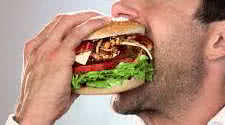Effects of Artificial Sweeteners: Aspartame & your Appetite Levels

Get the Real Facts or Fiction on Artificial Sweeteners
Some people worry that the artificial sweetener aspartame can increase appetite. This isn't an outlandish speculation,
since aspartame, marketed as NutraSweet, is sweeter than table sugar or sucrose. But several studies have shown that
aspartame doesn't increase appetite, and a new study finds that it may even suppress appetite.
The study, reported in the journal Physiology and Behavior, looked at the effects caused by ingesting capsules filled
with 400 milligrams of aspartame (about as much as is contained in a glass of diet cola). The subjects, 36 young men
and women, were divided into six groups: those who took either the aspartame capsules or a starch placebo five, 30 or
60 minutes before a meal.
Results revealed that aspartame had a significant appetite-suppressing effect on only the 60-minute group, which consumed
18.5% fewer calories than did the placebo unit. Aspartame didn't increase feelings of hunger. This study confirms earlier
findings that associated similar appetite-suppressing effects with taking aspartame about an hour before a meal.
What is the mechanism for this appetite suppression? The authors of the study suggest that aspartame works by promoting
the release of cholecystokinin, a hormone produced in the small intestine. This hormone is known to be a potent appetite
suppressor, and its release is usually stimulated by the ingestion of fat, which partially explains the higher satiety
value of a fat-rich meal.
Another possibility is that the two amino acids that constitute aspartame, aspartic acid and phenylalanine, may jointly
activate satiety receptors located in the intestinal lining. Whatever the mechanism at work, at least you don't have to
worry about aspartame ruining your diet.
In recent articles at fitFLEX, you may have read about Jay Cutler drinking Crystal Light or Ernie Taylor mixing Diet Coke with
tuna fish, of all things, and wondered about those choices. Factors influencing selection of sugar versus non sugar sweeteners
include taste, calories and certain conditions such as diabetes/insulin resistance. Many people also prefer artificial sweeteners
because they easily dissolve in liquids.
As for the bodybuilders, it could simply be that they have a sweet tooth - after all. Equal is 200 times sweeter than table
sugar and Sucralose is 600 times sweeter. Matching that sweetness would require a large amount of sugar packets, which would
add extra calories to a person's diet. Some bodybuilders are also concerned about the high glycemic index of sugar, and try to
eat carbs that have a steadier entry into the bloodstream (glucose has a rating of 100, while artificial sweeteners are
extremely low on the index).
As one teaspoon of sugar has only 15 calories, the number saved by using artificial sweeteners only comes into play when you
take the entire diet into account. For example, sweeteners are also in products such as diet sodas, and if one chose an
artificially sweetened soda over the regular version, they'd save over 100 calories a pop.
That being said, many nutritionists and medical professionals recommend not using the sweeteners for a variety of reasons. Some
believe that using artificial sweeteners actually leads to a paradoxical increase in food consumption and appetite; some people
may overcompensate for the calories they've saved-the "I'll have the chocolate cake with my Diet Coke" syndrome. According to
one review, however, no connection was found between artificial sweeteners and increased food intake (A. Drewnowski, "Intense
sweeteners and the control of appetite," Nutrition Reviews, 53[1]:1-7,1995).
The sweetener saccharin, which is contained in Sweet'n Low, has a bad rap. Research has suggested that saccharin causes bladder
tumors in rats, hence the printed warning that must appear on products containing it. However, there are differences in the
urinary systems of rats and humans, and according to Nutrition: Concepts and Controversies, "it goes without saying that overloading
on huge saccharin doses is probably not safe, but consuming moderate amounts almost certainly does not cause bladder cancer in
human beings."
Nutrasweet, marketed under the brand name Equal, contains aspartame, which is a blend of the amino acids phenylalanine and aspartic
acid. There have been anecdotal reports of adverse effects on the brain and body because of aspartame, though none of these
effects have been proven. Researchers at the Massachusetts Institute of Technology conducted a randomized double-blind placebo-controlled
study to investigate aspar-tame's effects (P.A. Spiers et al., "Aspartame: neuropsychologic and neurophysiologic evaluation of acute
and chronic effects/' American Journal of Clinical Nutrition, 68[3]:531-37f 1998). According to the scientists, "Large daily doses
of aspartame had no effect on neuropsychologic, neuro-physiologic, or behavioral functioning in healthy young adults." While this
was not a long-term study, the FDA has nonetheless concluded that aspartame is safe in moderate quantities.
Sucralose, brand name Splenda, was approved by the FDA in 1998 and is considered safe, based on available research. Sucralose
retains its sweetness under various conditions, making it useful for cooking and baking. One other sweetener you may have heard
of is Ace-K (acesulfame potassium), which, along with aspartame, is used in the new diet drink PepsiOne.
Clearly, those who consume many packets of sweeteners per day may be considered to have a "habit." Take into account diet drinks,
sugar-free gum, breath mints, fat-free yogurt and many other artificially sweetened foods, and you see that there's a risk of
overdoing these products. Artificial sweeteners appear to be safe in moderate amounts. If you choose to use them, keep moderation
in mind until we definitively know their long-term high-use effects.